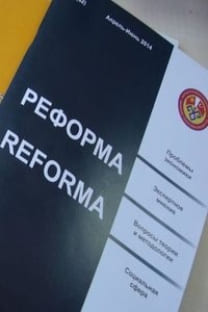TAX PERCEPTION IN KYRGYZSTAN
Taxes are the main source of every government’s revenue. Tax perception is the first step to the willingness to pay taxes that called tax morale. According to the state of the tax perception taxpayer will choose to pay or evade taxes. That’s why positive tax perception and tax awareness are directly affect tax behavior and government revenue.
Anahtar Kelimeler:
Tax Perception, Voluntary tax compliance, Kyrgyzstan
TAX PERCEPTION IN KYRGYZSTAN
Taxes are the main source of every government’s revenue. Tax perception is the first step to the willingness to pay taxes that called tax morale. According to the state of the tax perception taxpayer will choose to pay or evade taxes. That’s why positive tax perception and tax awareness are directly affect tax behavior and government revenue.
Keywords:
Tax Perception, Voluntary tax compliance, Kyrgyzstan,
___
- Abdiyeva, R. & Cumakunova, T. (2017). Vergi Bilincini Etkileyen Demografik ve Siyasi Faktörler: Kırgızistan Örneği. Sosyoekonomi, 25(2), 71–80. https://doi.org/10.17233/sosyoekonomi.289927
- Akıncı, A. & Başol, O. (2015). Vergi algısı üzerine bir alan araştırması: Kırklareli ilinde yaşayan insanların vergi algısı. Dumlupınar Üniversitesi Sosyal Bilimler Dergisi, 43, 170179.
- Alm, J., Martinez-Vazque, J., and Torgler, B. (2006) Russian Attitudes Towards Paying Taxes – Before, During and After the Transition. International Journal ofd Social Economics, 33 (12), 832-857.
- Frey, B.S. and Torgler, B. (2007) “Tax Morale and Conditional Cooperation”, Journal of Economic Comparative Economics, 35, pp. 141-144.
- Özgün, Z. ve C. Yüksel (2018) Mersin’de Vergi Mükelleflerinin Vergi Algisi, Vergi Bilinci ve Vergi Ahlaki Düzeyinin Ölçülmesi, Mersin Üniversitesi Sosyal Bilimler Enstitüsü e-dergi Cilt 1 - Sayı 2 / Haziran: 33-48s
- Sağlam, M. (2013). Vergi algısı ve vergi bilinci üzerine bir araştırma: İktisadi ve idari bilimler fakültesi öğrencilerinde vergi algısı ve bilinci. Sosyoekonomi, 1, 315-334.
- Torgler, B., (2004). “Tax Morale Trust and Corruption: Empirical Evidence from Transition Countries”, CREMA Working Paper, No: 2004-5, Basel.
- Torgler and Schaffner (2007) “What Shapes Attitudes Toward Paying Taxes? Evidence from Multicultural European Countries”, Social Science Quarterly, Vol. 88, No 2., pp. 443-467
- ISSN: 1694-5158
- Yayın Aralığı: Yılda 2 Sayı
- Başlangıç: 1999
- Yayıncı: Kırgızistan Türkiye Manas Üniversitesi
Sayıdaki Diğer Makaleler
TÜRK CUMHURİYETLERİNDE TURİZM-İKTİSADİ BÜYÜME İLİŞKİSİ: PANEL NEDENSELLİK ANALİZİ
Razia ABDİEVA, Boogachy DOOLOTALİEV
THE DEVELOPMENT OF ANIMAL HUSBANDRY IN HOUSEHOLDS IN KYRGYZSTAN
Nurlan MAMATOV, Junus GANİEV, Raziya ABDİEVA, Damira BAİGONUSHOVA
TECHNOLOGICAL PARADIGM OF THE EFFECTIVE INDUSTRIAL DEVELOPMENT OF THE KYRGYZ REPUBLIC
Turusbek ASANOV, Marat KUDAİKULOV
Cemal SEZER, Gulnara KARADENİZ
